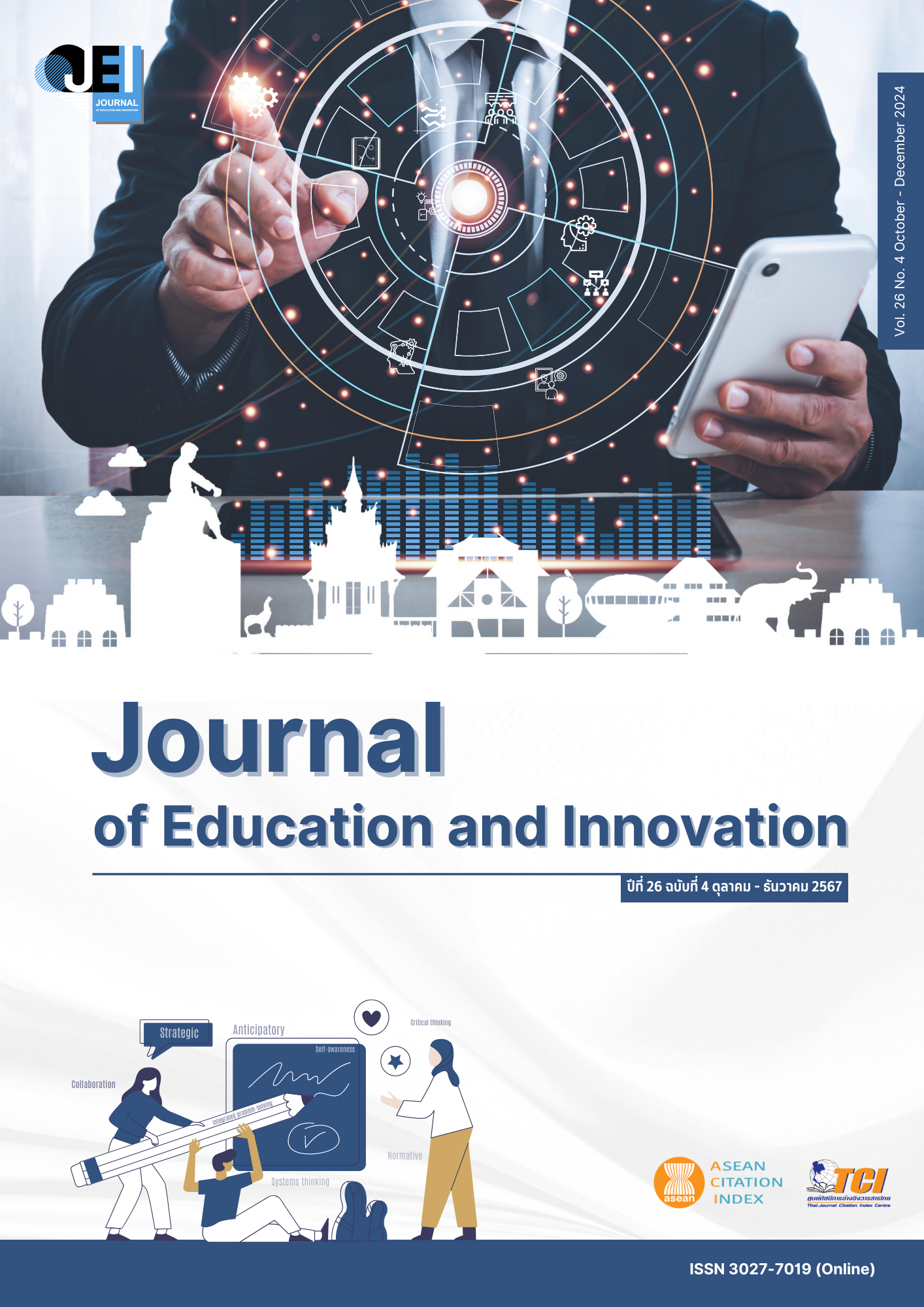A FACTOR ANALYSIS OF CLASSROOM ACTION RESEARCH COMPETENCY FOR DEMONSTRATION SCHOOL TEACHERS UNDER AUTONOMOUS UNIVERSITY
Main Article Content
Abstract
The purpose of this research was to analyze the components and determine the weight of each component of classroom action research competency of teachers at Demonstration School. Under autonomous university, the sample group were teachers at a demonstration school. 600 people belonging to state-run higher education institutions in Thailand were obtained from stratified random sampling. Data were collected and compiled using questionnaires. which has the characteristics of a 5-level rating scale and analyzes the data using exploratory factor analysis. By extracting the main components and the obtained components were rotated on the orthogonal axis (Orthogonal Rotation) by rotating the axis orthogonally with each variable being independent of each other using the Varimax method. The results of the research found that a total of 40 variables studied were observed. Created 3 components, able to explain the variance in 35 observed variables at a high level, with a cumulative percentage of variance equal to 74.245. The results of this study reveal that Components of classroom action research competency for Demonstration School teachers include: Component 1 is Ability to do classroom action research (explains 41.266% of the variance), Component 2 is Innovative creativity characteristics in education (explains 17.104% of the variance), and component 3 is Ethics and characteristics of successful classroom action research (explains 15.875% of the variance) respectively.
Article Details

This work is licensed under a Creative Commons Attribution-NonCommercial-NoDerivatives 4.0 International License.
The owner of the article does not copy or violate any of its copyright. If any copyright infringement occurs or prosecution, in any case, the Editorial Board is not involved in all the rights to the owner of the article to be performed.
References
Boonpen, P., Chaijukul, Y., & Yolao, Y. (2018). Research competency and the variables affecting successful research: A case study of National Research Universities. Kasem Bundit Journal, 9(1), 73-88.
Boonphadung, S. (2014). The Development of Teachers’ Research Competency based on Vygotsky’s Zone of Proximal Development (ZPD) and Partnership. Journal of Education Naresuan University, 16(4), 22-33.
Cerny, C. A., & Kaiser, H. F. (1977). A study of a measure of sampling adequacy for factor-analytic correlation matrices. Multivariate Behavioral Research, 12(1), 43-47.
Chulalongkorn University. (2012). Chulalongkorn University regulations: concerning the appointment to the position of developing level, advance Level of demonstration school teacher B.E. 2012. Retrieved December 14, 2012, from https://www.edu.chula.ac.th/sites/default/files/users/user8/1.pdf
Hair, J. F., Anderson, R. E., Tatham, R. L., & Black, W. C. (1995). Multivariate data analysis: With reading (4th ed). New Jersey: Prentice Hall.
Hair, J. F., Anderson, R. E., Tatham, R. L., & Black, W. C. (1998). Multivariate data analysis (5th ed). New Jersey: Prentice Hall.
Kaiser, H. F. (1974). An index of factorial simplicity. Psychometrika, 39, 31–36.
Ketchararat, M. (2015). A Study of Desirable Competencies of Kasetsart University Lecturers. Journal of Education Studies, 43(1), 112-127.
Kongkhao, R., Sitthisomboon, M., & Lincharoen, E. (2016). The development of supervision model to enhance the research competency for learning development of teachers in basic education. Journal of Education Naresuan University, 18(1), 74–82.
Mookkaew, K., Naiyapatana, O., & Tungprapa, T. (2022). The analysis of classroom action research competency and factor necessary for demonstration school teacher under autonomous university. Journal of Buddhist Anthropology, 7(7), 33–49.
Office of the Basic Education Commission. (2010). National Education Act B.E. 2542 and amendments (No. 3) B.E. 2010. Bangkok: Office of the Prime Minister.
Office of the Education Council. (2008). Research report. Teacher competencies and guidelines for teacher development in a changing society. Bangkok: Prikwarn Graphic.
Office of the Higher Education Commission. (2010). Manual for educational quality assurance within educational institutions. Higher education level 2010. Bangkok: Pab Print.
Secretariat Office of the Teachers Council of Thailand. (2005). Professional standards in education. Bangkok: Secretariat Office of the Teachers Council of Thailand.
Sitthiamorn, S. (2016). The development of competency research and development through empowerment and self-efficiency for teacher at secondary schools. Journal of Education Research Faculty of Education. Srinakharinwirot University, 10(2), 174-185.
Smithikrai, C. (2009). Recruitment selection and performance evaluation of personnel (3rd ed). Bangkok: V Print.
Srinakharinwirot University. (2019). Announcement of Srinakharinwirot University regarding criteria and methods for promotion to higher positions of academic university employees. demonstration school teacher B.E. 2019. Retrieved December 14, 2019, from https://edocument.swu.ac.th/showdetail.asp?doc_id=38748&doc_type_cd=4&BOX_SERIES=39335&SERIES=1
Suwanno, P. (2017). Development of research competency evaluation model for lecturers of Southern Rajabhat University (Doctoral dissertation). Chonburi: Burapha University.
Tabachnick, B. G., & Fidell, L. S. (2013). Using multivariate statistics (6th ed.). Boston: Pearson.
Wongwanich, S. (2014). Classroom action research (17th ed). Bangkok: Chulalongkorn University Press.


